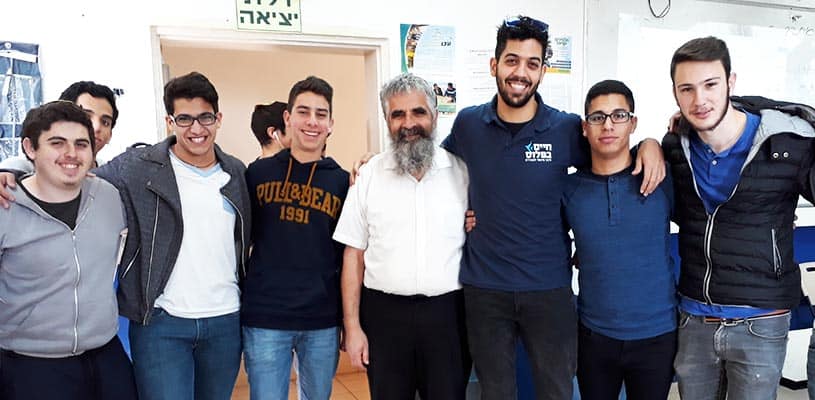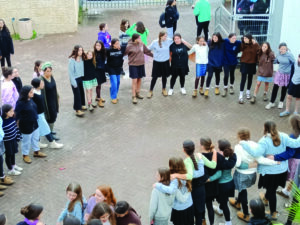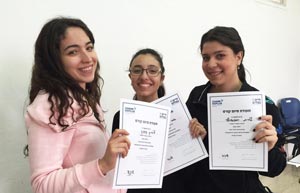
Sixty-eight percent of Millennials in the United States say that debt has had a negative impact on their life, according to a recent survey. That fact comes as no surprise to Mindy Ajzner, who has witnessed firsthand the devastating effects that debt can have on families—and has
worked to change that in Israel by educating youth about financial responsibility.
Ajzner, a native of Toronto, Canada, who immigrated to Israel—where she says the majority of the country’s population is in overdraft—trained and volunteered as a financial coach for families in debt. After several years of helping people in dire financial straits, she decided to establish Chaim BePlus, a program that focuses on poverty prevention through education.
“When I saw the suffering of the people in debt—health-wise and divorces and family breakdowns and everything—I decided I wanted to do education in order to prevent people from going into debt,” said Ajzner. “So I started this financial literacy program in Israel.”
The program, whose name literally means “living in plus” and is a play on words for being in the black, provides courses in personal financial management to young adults aged 17-21. In the five years since the program launched, some 25 AMIT schools have participated, meaning that nearly 2,000 AMIT students have learned the basics of creating a budget for themselves, reading a bank statement, saving toward a future goal, and simply making better choices with their money.
Chaim BePlus employs mentors who teach the students about financial self-sufficiency in five sessions and according to a curriculum that Ajzner created. Each session is on a different topic.
“It’s about your budget and your rights as a worker, and how kids can earn money and how to make savings plans, and how to understand your bank statement,” she said. “The mentors are very cool and fun to be with, so there’s like a youth movement to the atmosphere. They play games and watch videos, and they fill out tables and do applications.”
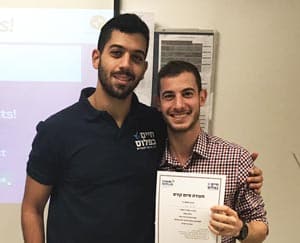
The main thing that inspires the students, though, is the mentors, who describe how they became financially independent and what that has enabled them to achieve in life.
Ron Omsi, a student at AMIT Hammer in Rehovot, said that the program gave him the tools to live a better, more stable life. Omsi, who works at a bakery in addition to attending school, said he had thought about saving money before taking the course, but that it was hard to execute.
The Chaim BePlus mentor gave him a new perspective on finances. “He taught us to save, but not to sacrifice quality of life,” he said, adding that it’s all a matter of moderation. Once a week Omsi will sit down and review his finances—his earnings, his spending and make informed choices about how best to use his money.
He said that the class also taught him how to navigate the often-confusing bank jargon of commissions, interest rates, and investment options. He now has a savings account and has invested the savings in order to get a better return than the 0.1% he was initially getting.
In addition to the in-school sessions, the students also have 10 tasks they must complete, like signing in to their bank account online, keeping a list of everything they bought that week, and figuring out how much money they have to spend depending on what they earn.
Ajzner said that the program works well with AMIT’s mission of closing the opportunity gap for Israeli children, especially those from weaker socioeconomic backgrounds. Despite coming from underprivileged areas, Ajzner said that many of these children spend what she called “jaw-dropping” amounts of money on leisure, clothes and sneakers, food and other ephemeral goods.
“For a lot of these kids, this is their status,” Ajzner said. “That’s why we’re working so hard with them, with the mentors, who tell them, not in a way that’s authoritarian or like a teacher, ‘If you go to university, you’ll have a profession. If you save up money instead of going out for hamburgers every week, all that adds up to money that you can put aside and take the pre-university exams, or even driving lessons—things that will help you.’”
In a video testimonial of one AMIT student (in Hebrew), he describes how he used to spend 400 or 500 shekels apiece on name-brand sweat suits, but that the program helped him understand the value in saving—not to mention in online shopping, where he could find the same sweat suits at a fraction of the price.
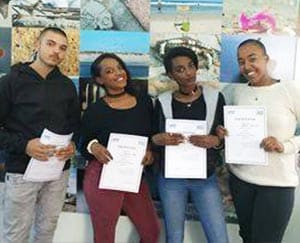 Another AMIT student explains how Chaim BePlus taught him to save up, get out of his overdraft, and even invest some of what he saved toward future goals.
Another AMIT student explains how Chaim BePlus taught him to save up, get out of his overdraft, and even invest some of what he saved toward future goals.
It’s all about changing the students’ mentality, said Ajzner.
“You have to be switching the mindset that these kids themselves, they can make it,” she said. “They don’t have to be tzedakah cases. They can make it, but you just have to talk to them about independence and what a great thing it is not to be dependent.”
Chaim BePlus also checks in with the students via a WhatsApp group after they have completed the program, to make sure they are sticking with it.
“They learn that it’s about choice and it’s about taking charge of your life,” said Ajzner. “The people that are in debt, it’s like the money took charge of them. They just didn’t control it, and whatever they thought they wanted, they bought. We’re trying to bring back the control and say, ‘You know, I can choose. I can’t have everything, and I’m going to be happy about my choice because I’m planning ahead and I’m seeing it in the context of my goal.’”
Omsi agreed. His goal is to save up so that he can live a secure life in his own home.
The students who complete the program don’t just help themselves, though—they are also helping their families. Ajzner said she has seen a trickle-down effect with students who then help their parents create a budget, or go through their parents’ bills and find ways to help them save money.
“These kids’ parents need relief from these money-guzzling kids of theirs,” Ajzner said jokingly. “As the kids graduate from the program, we’re teaching them not to ask their parents for money. That also helps the parents, because we want the parents to be saving up for their old age, which is very important.”

